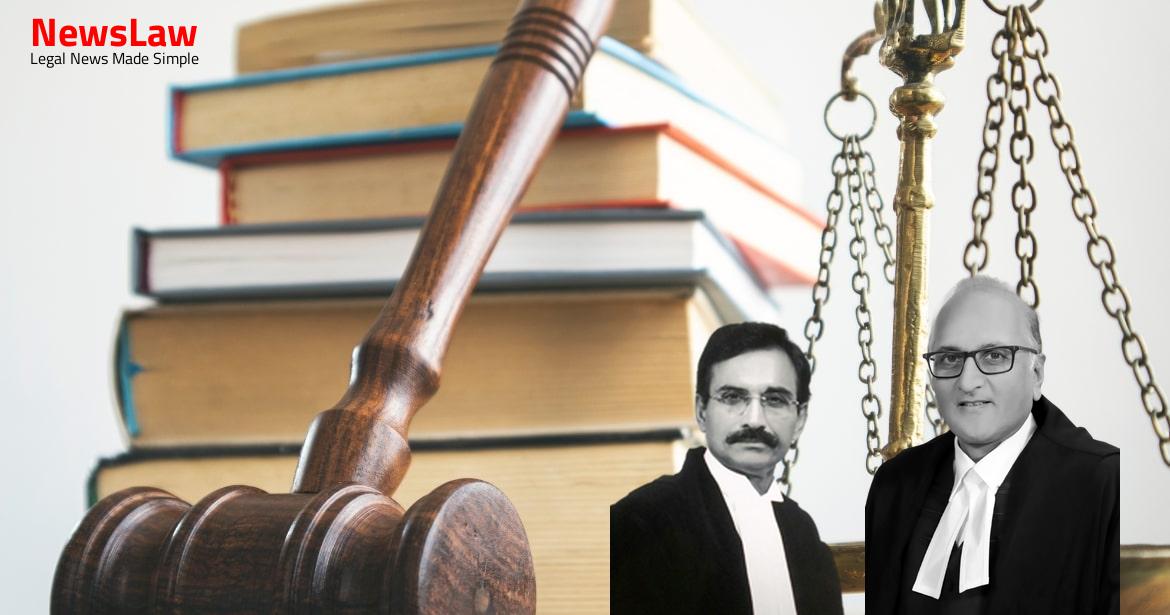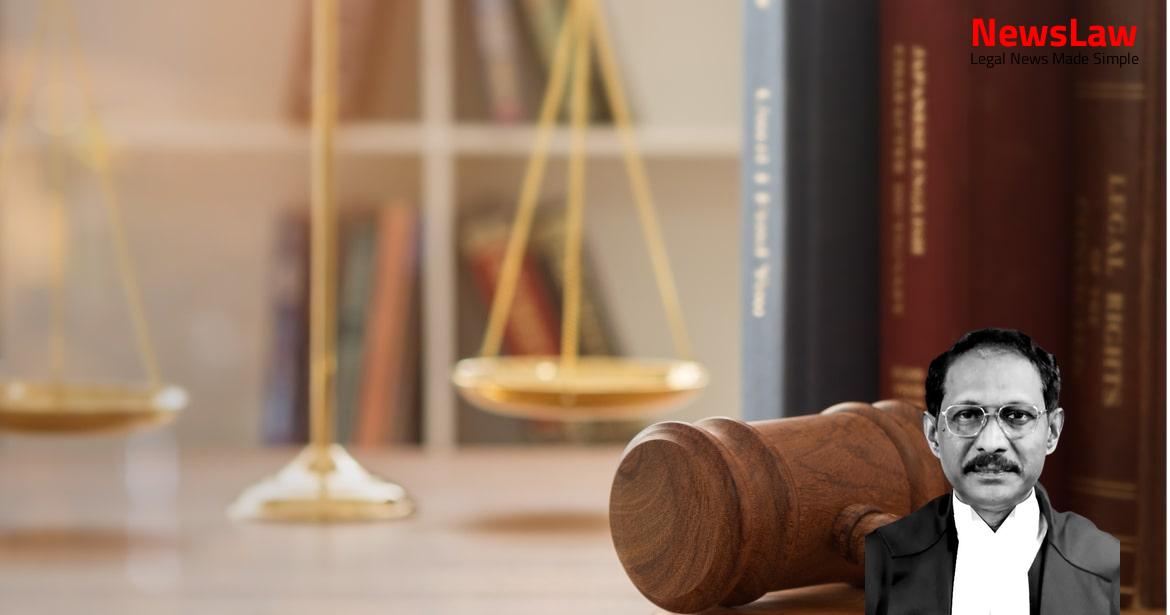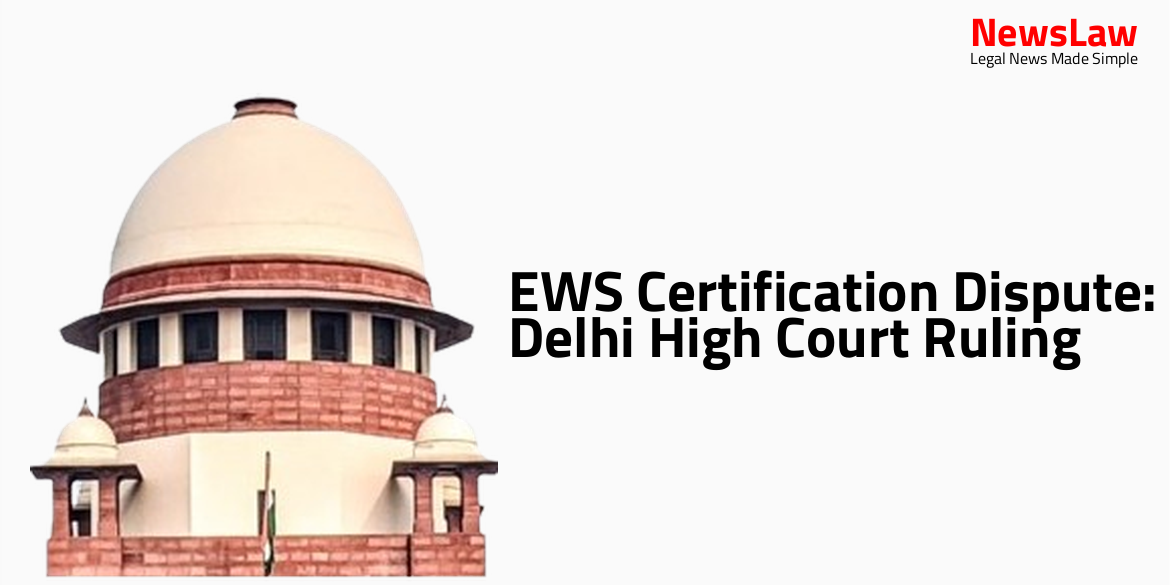Delve into the detailed legal scrutiny of equivalence in admissions to medical courses as per recent court judgment. The case sheds light on the interpretation of eligibility criteria and regulations, emphasizing the importance of meeting specific subject requirements for admission. This analysis is essential for students navigating the complex process of applying to medical schools.
Facts
- The ASG referred to Regulation 4(1) of the MCI Regulations on Graduate Medical Education, highlighting the eligibility criteria for admission to the Medical Course.
- The Regulation specifies the required subjects and qualifications for admission, emphasizing the importance of completing a course in Biological Sciences equivalent to the 10+2 qualification.
- The High Court relied on various certificates and documents to determine the student’s eligibility, and concluded that the University acted arbitrarily in rejecting her candidature.
- The ASG argued that the University was justified in its decision as there was insufficient proof of the student completing a full course in Biological Sciences, impacting the equivalence of her qualifications.
- The student approached the High Court on 24.12.2020 with certificates from Conrad High School and Telangana State Board of Intermediate Education.
- University issued a notification on 23.12.2020 for second round of online counselling for MBBS/BDS seats.
- Student had applied for management quota for NRI candidates for MBBS course in AY 2020-21.
- University published a list on 12.12.2020 mentioning the lack of proof of study in Biological Science subject.
- Student obtained a letter from the Consulate General of India in New York stating equivalence of education.
- High Court allowed the writ petition filed by the student declaring the University’s action as illegal.
- Student was permitted to participate in counselling process despite initial ineligibility.
- University later filed an application to vacate the interim order and explained reasons for the student’s ineligibility.
Also Read: Legal Analysis of Claim for Loss of Profit in Delayed Contract
Arguments
- The petitioner argued that the candidate held equivalent qualifications for a medical UG/MBBS course.
- The Regulation 4(2) was analyzed, particularly focusing on Regulation 4(2)(f) which does not expressly state that the candidate must undergo schooling in the concerned subject, in this case, Biology/Biological Sciences in every year.
- Letters and certificates from Conrad High School and the Telangana State Board of Intermediate Education were relied upon by the petitioner.
- The structure of pre-school through 12 grade in the US, especially in Connecticut, was clarified by the Assistant Principal of Conrad High School.
- High school education in the US allows for elective courses in various subjects beyond core classes, and students are encouraged to take challenging courses to prepare for college and future careers.
- Rulings from the Madras High Court in similar cases were cited to support the interpretation of Regulation 4(2) as correct.
- The MCI’s Regulation 4(2) provides for equivalence in various situations, including overseas qualifications.
- The AP Biology course at Conrad High School was described as equivalent to a first-year college Biology course and aligned with courses at the University of Connecticut.
Also Read: Public Declaration Requirement in Marriage under Hindu Marriage Act
Analysis
- The MCI regulations outline six qualifications for eligibility for the Medical Course.
- Each sub-clause of the regulations should be considered independently, and none can be read together.
- Regulation 4(2)(a) and Regulation 4(2)(f) are specifically considered in this case.
- The High Court’s interpretation was criticized for not closely scrutinizing the equivalence certificate and subject stipulations.
- The equivalence certificate obtained by the petitioner allowed her to write the NEET examination and secure a seat in the college.
- The University’s requirement that the candidate should have studied Biology, in addition to Physics, Chemistry, and English, in all relevant years is deemed reasonable.
- The structure of the Dental Council of India regulations was compared to the MCI regulations in this case.
- Once the Equivalence Certificate is provided, additional scrutiny on eligibility should not be required.
- The emphasis on practical study and training in Physics, Chemistry, and Biology at the intermediate or 10+2 level is crucial for admission.
- Marks in Mathematics should not be considered for admission to a Medical Course as per the regulations.
- The candidate needs to demonstrate clear evidence of having studied the necessary subjects during the stipulated years.
- The interpretation of the regulations by the High Court was deemed incorrect, and the impugned order was set aside.
- The court in State of Bombay v. R.M.D. Chamarbaugwala interpreted the definition of a ‘prize competition’.
- In Kashvi Udhayakumar, the court noted relevant facts regarding the equivalence of a high school diploma obtained in the USA to the 12-year senior school Certificate of Central Board of Secondary Education.
- The High Court relied on Sharanya Balaji Nadar to establish that each sub-clause of Regulation 4(2) was independent.
- The qualification held by an NRI candidate who studied in the USA was deemed equivalent to prescribed eligibility conditions.
- A prize competition was defined to include various types such as crossword prize competitions, picture prize competitions, and any other prize competition where the solution is or is not prepared beforehand by the promotors or determined by lot or chance.
- The last qualification regarding determination by lot or chance was specifically attached to the last sub-clause on ‘any other competition.’
- In the judgment of the Madras High Court in Sharanya Balaji Nadar, the candidate applied for admission and was allowed to appear in the common entrance examination.
Also Read: OCI Cardholders’ Rights and Retroactive Notifications
Case Title: KALOJI NARAYANA RAO UNIVERSITY OF HEALTH SCIENCES Vs. SRIKEERTI REDDI PINGLE (2021 INSC 92)
Case Number: C.A. No.-000390-000390 / 2021



